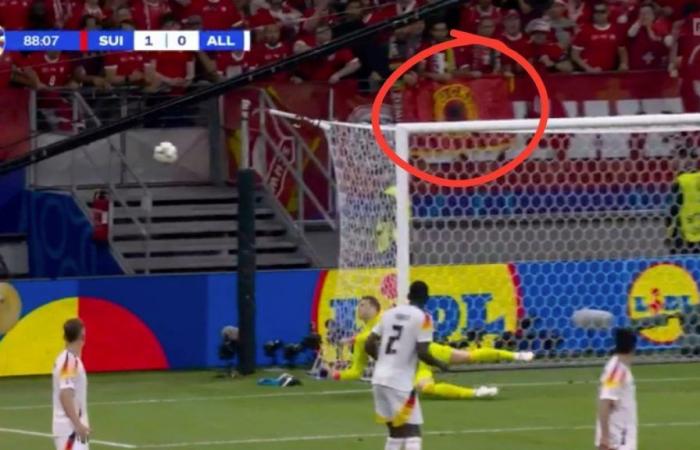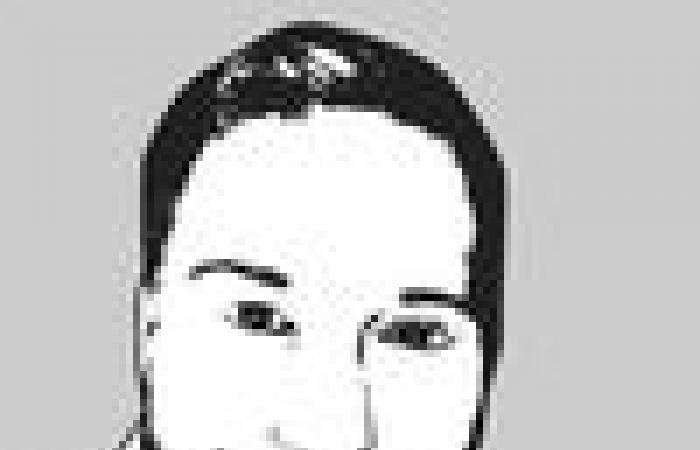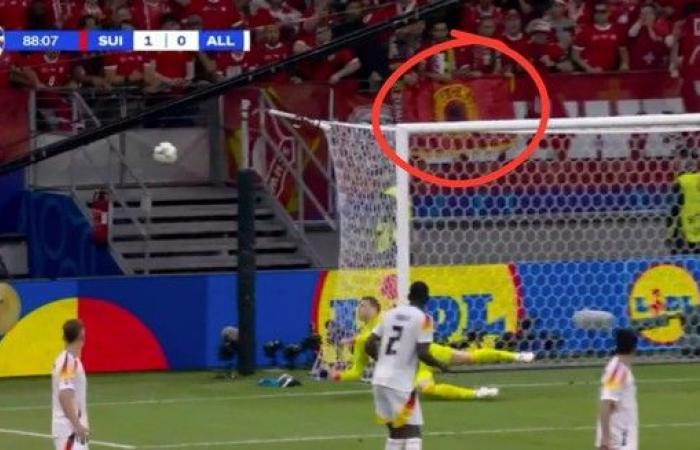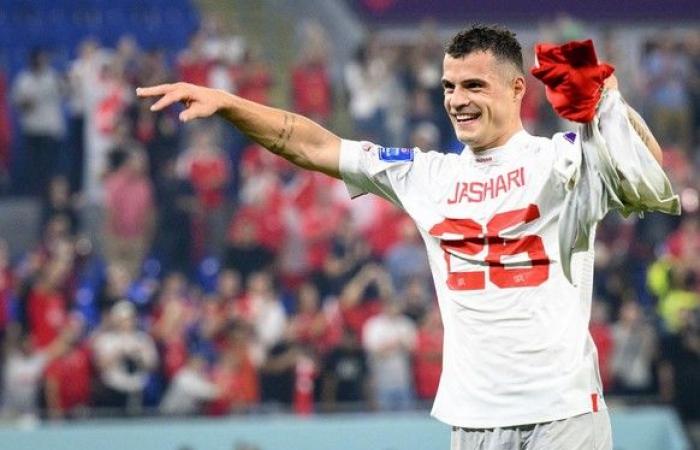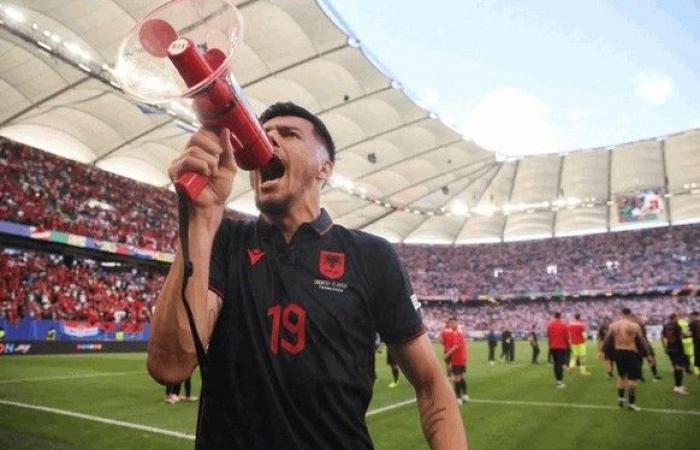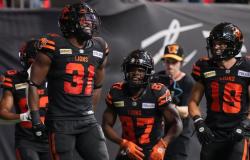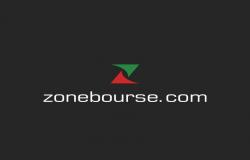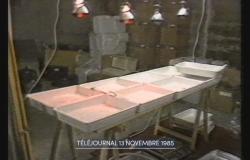The controversial flag in question, during the Switzerland-Germany match on Sunday. image: rts screenshot
A controversial standard was displayed among Swiss supporters in the stadium on Sunday in Frankfurt against Germany. It brings back the old demons of the wars in former Yugoslavia.
06/25/2024, 05:5406/25/2024, 08:09
He could almost have gone unnoticed amid all the red from the Swiss fans this Sunday in Frankfurt, but the three large yellow letters – UCK – and the two-headed black eagle he displays unmasked him. Yes, it is indeed a flag of the Kosovo Liberation Army (Ushtria Çlirimtare e Kosovës, in Albanian, whose initials are UCK) which was deployed in the middle of the Nati supporters during the match against Germany (1-1).
It did not take long for a controversy to arise around the presence of this flag in the stadium. Several Internet users took offense on social networks, just like the Serbian media Kurirwhich speaks of a “scandal”, of “shameful provocations” and calls on UEFA by asking it, sarcastically, “if the flag of a terrorist organization has its place in the stadium”.
The flag in question during Switzerland-Germany
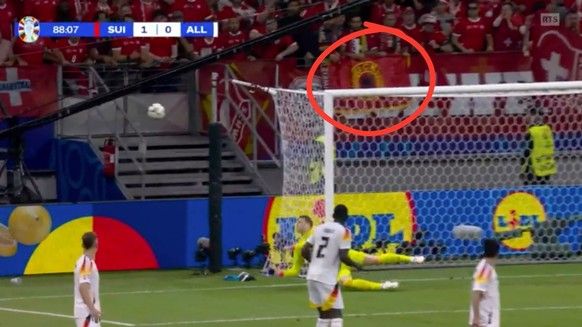
No, the UCK is by far not a simple group of football ultras who have placed their tarpaulin among those of other fans. This is the paramilitary organization created by Kosovo Albanians in the 1990s, which led an armed struggle against Serbia for the independence of this territory – with an ethnic Albanian majority – then belonging to Belgrade.
The group is accused of war crimes and crimes against humanity.
He is accused, for example, of having set up a trade in organs extracted from Serbian prisoners. Several of its leaders have been tried at the Special Court in The Hague, including Salih Mustafa in 2022, sentenced to 26 years of imprisonment for murder, torture and arbitrary detention.
Of the background between the Nati and the UCK
The Frankfurt affair recalls a previous one which also concerned the Nati. In October 2021, after a Switzerland-Northern Ireland match at the Stade de Genève, an intruder invited himself onto the pitch after the match and placed a jacket with the UCK logo on the shoulders of Xherdan Shaqiri, in the middle of a live interview on TV. The star of the Swiss team (of Kosovar origin), embarrassed, had the reflex to quickly remove the item of clothing and remain very neutral in his interaction with the individual. The same evening, the Swiss Football Association (ASF) condemned the action https://twitter.com/nati_sfv_asf/status/1447180420789977095?ref_src=twsrc%5Etfw
“It is unacceptable that people want to use football stadiums, and in this case an interview with a player after a match, for political propaganda purposes.”
The scene in question

image: screenshot x
There is no doubt that the leaders of the ASF will not have had much of a taste for the KLA flag on Sunday in Frankfurt either.
At the 2022 World Cup, Nati captain Granit Xhaka, also of Kosovar origin, sparked a controversy after the victory against Serbia (3-2): he had worn the jersey of his teammate Ardon Jashari at the ‘reverse, with the name clearly highlighted on the chest. Although Xhaka never confirmed this, many saw it as a tribute to Adem Jashari, the KLA leader killed by Serbian forces in 1998.
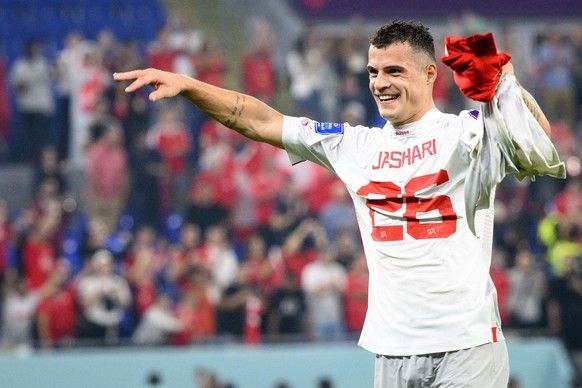
Granit Xhaka and the “Jashari” flocked jersey after the match against Serbia at the 2022 World Cup.Image: KEYSTONE
One question remains: how can a banner praising a paramilitary group so easily pass the search and remain hanging for more than an hour and a half in full view in a Euro stadium?
It is all the more surprising since the security guards employed by UEFA are rather attentive to the messages on the fans’ flags: at Euro 2016 in France, Vaudois Nati supporters were unable to bring in their flag cantonal in the Parc des Princes during Switzerland-Romania. And for good reason: security – which apparently had some shortcomings in Swiss geography – feared, with the inscription “liberty and fatherland”, that the “flag conveys messages other than that of supporting a team”, explained 24 hours.
Calls to murder and burned flag
The UCK flag is not the first controversy surrounding Kosovo, Albania and Serbia during this Euro. Several fans and players from both camps – on one side the Kosovars and Albanians, on the other the Serbs – exploited the tournament by spreading hateful political messages. For example, there was Albanian striker Mirlind Daku, filmed after the match against Croatia on Wednesday singing insulting songs towards North Macedonia into a megaphone. He was suspended by UEFA for the next two matches.
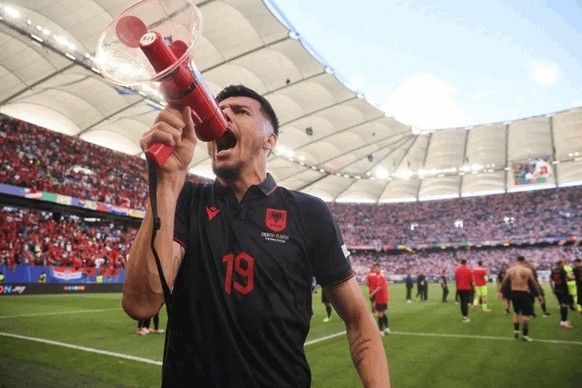
Mirlind Daku in action. image: screenshot x
The European body also imposed a fine of 25,000 euros on the Albanian federation for this act. During the same match, Albanian and Croatian fans were heard chanting: “Kill, kill, kill the Serbs!” Following which the Serbian federation threatened to leave the tournament if UEFA did not sanction its Albanian and Croatian counterparts.
During the England-Serbia match, a Kosovar journalist provoked the Serbian fans in the stadium by mimicking the Albanian double-headed eagle in front of them with his hands. His accreditation was withdrawn.
But Serbia is not left out. His federation was fined 14,500 euros by UEFA because of inappropriate behavior by its fans at the Euro. Among them: the display of nationalist flags – including that of a paramilitary group – and racist chants against Kosovo. “Kosovo is the heart of Serbia,” for example, chanted Red and White supporters on Marienplatz in Munich. Others burned an Albanian flag in the streets of Gelsenkirchen.
As a reminder, Serbia does not recognize the independence of Kosovo, which the latter self-proclaimed in 2008. The majority of Western countries (including Switzerland and the United States) recognize it, but this is not the case from Spain, Russia or China, for example.
All that remains is to hope that the geopolitical tensions, observed in the stands of the Euro stadiums, do not tarnish the spectacle on the field for the rest of the tournament.
More articles about sport
Show all articles

